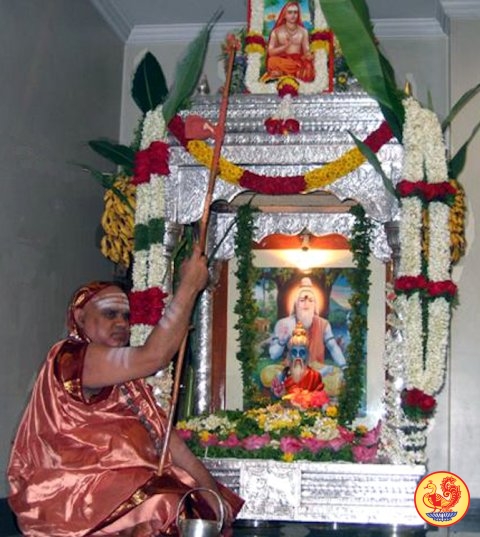Chaturmasya Vrata

Sri Bharati Tirtha Mahaswami taking the vow of Chaturmasya at Sringeri
ॐ नमो ब्रह्मादिभ्यो ब्रह्मविद्यासम्प्रदायकर्तृभ्यो नमो गुरुभ्यः ।
The Poornima (full moon day) in the month of Ashadha is called ‘Guru Poornima’. On this sacred day, worship is offered to Brahma Vidyacharyas – the great luminaries of antiquity, who through their Supreme grace, have handed over the knowledge of Brahman – Brahma Vidya – through a long, continuous and uninterrupted line of Acharyas, to the world of seekers of Self. Special pujas are performed to the hierarchy of Gurus, Parama Gurus, Parameshti Gurus, Parapara Gurus and all Brahma Vidya Acharyas, seeking their inestimable blessings to realise the Supreme Truth. This is also
called ‘Vyasa Puja’, for, Sri Vedavyasa stands foremost in the line of these preceptors. It was Vyasa who codified the Vedas into four divisions and integrated the messages of the Upanishads relating to Brahman, Jiva and the Universe in his great book, the Brahmasutras. He is rightly addressed as one of ‘vast intellect’ (विशालबुद्धे) ‘the ancient sage’ (पुराणमुनिः) by whom was lit the lamp of knowledge, feeding it with the oil of Mahabharata.
येन त्वया भारततैलपूर्णः
प्रज्वालितो ज्ञानमयः प्रदीपः
Suka, Gaudapada and Govindabhagavatpada kept this light burning; then came the Great Master Sri Sankaracharya, who carried it far and wide throughout Bharata Varsha.
A popular verse compendiously expresses the many dimensioned greatness of Veda Vyasa and Sri Sankaracharya and offers obeisance to them:
शङ्करं शङ्कराचार्यं केशवं बादरायणम् ।
सूत्रभाष्यकृतौ वन्दे भगवन्तौ पुन: पुन: ॥
The term Chaturmasya means four months. The term Chaturmasya Vrata is a Vrata to be observed for a period of four months. But according to the Vedic dictum पक्षा वै मासाः one ‘paksha’ or a fortnight is taken as one month, and traditionally the Vrata is observed only for two months. During the rainy season, Sannyasins observe Chaturmasya and stay at one place to meditate on the Absolute Reality and instruct their disciples in the spiritual lore.
समागतेभ्योऽन्तेवसद्भ्यः औपनिषदं साङ्ख्यं प्रतिपादयन्तो वर्तामहे ॥
so expresses the Srimukha issued by the Acharyas of Sringeri Math.
Before observing the Chaturmasya Sankalpa, they perform Vyasa Puja and pay homage to Dakshinamurti, Sadasiva and to the Acharyas who came after him, to the framers of the canons of Brahma Vidya – the knowledge of Brahman – to the great seers of the parampara and to the preceptors. The Narada Parivrajakopanishad which codifies the conduct of the Sannyasins in detail, lays down that Sannyasins must be moving from place to place, to avoid getting entangled with the dealings and habits of the people of the village or town. But during the rainy season, they must halt at one place for a period of four months and observe the Chaturmasya Vrata.
एकरात्रं वसेद् ग्रामे नगरे पञ्चरात्रकम् ।
वर्षाभ्योऽन्यत्र वर्षासु मासांश्च चतुरो वसेत् ॥
द्विरात्रं न वसेद् ग्रामे भिक्षुर्यदि वसेत्तदा ।
रागादयः प्रसज्येरँस्तेनासौ नारकी भवेत् ॥ (४-१४, १५)
ग्रामान्ते निर्जने देशे नियतात्माऽनिकेतनः ।
पर्यटेत् कीटवद् भूमौ वर्षास्वेकत्र संवसेत् ॥
The mendicant monk, except in the rainy season, may stay one night in a village and five nights in a city; during the rains, he may stay four months in a village or town. He shall not stay for two nights in a villages; if he stays, affection, lust, etc., may find scope to deflect him and thereby he may go to hell. In the outskirts of a village, in a secluded spot, he may pitch his camp and go about for alms like a worm on the ground; during the rains, he shall stay at one place.
If, during the rainy season, the Sannyasins move from one place to another, they may cause injury to many insects and worms that breed and move about on the ground during the season. But as the Sannyasins have taken the vow of non-injury to all creatures (Ahimsa and Abhaya), they should refrain from causing harm to any living being. Moreover, constant travel will also come in the way of Sannyasins having any time for ‘Brahma-vichara’ or for continued profound meditation; (निदिध्यासन). So, they halt at one place once in a year for four months and engage themselves in the meditation of the Supreme Brahman, in the company of their Gurus and other Sannyasins, clearing their doubts on complex metaphysical problems.
During the Chaturmasya Vrata, His Holiness observes various Vratas as listed below.
- Shravana Somavara Vrata
- Vara Mahalakshmi Vrata
- Gokulashtami Vrata
- Vamana Jayanti
- Ananta Padmanabha Vrata and lastly
- Uma Maheshwara Vrata, marking the conclusion of Chaturmasya Vrata.
